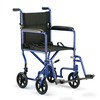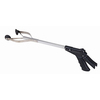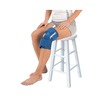Coronavirus Advice For Caregivers And Wheelchair Users
Posted on
Nothing is more important to us than our community of valued clients. And having worked to provide aids and equipment to people with a variety of conditions and disabilities, we’re aware of how hard this current climate is for our customers.
With that in mind, here’s our advice as to some of the best practices and guidance for our customers to navigate accessibility issues during the COVID-19 crisis.
No matter what you do—it’s essential to check with professional medical advice first, and this can be found by consulting your doctor or visiting the official government website.
If Someone You’re Caring For Gets Infected
If the worst does happen and someone you’re in charge of caring for becomes infected, it’s important not to panic, and to take the necessary steps to ensure you both remain safe during the infection period.
By taking these steps, you should still be able to provide care and support:
-
Make sure you both understand and follow medical advice from doctors regarding medication, bed rest, and care
-
Monitor their symptoms and alert their primary healthcare provider if their condition changes
-
Wherever possible, use separate bathrooms and bedrooms
-
Do not allow any additional visitors
-
Disinfect hands and surfaces frequently
If you are no longer able to provide support in person, then you should try and provide as much care as you can through phone calls and video chats, as well as helping to arrange alternative care provision.
How To Look After Yourself As A Caregiver
While your first priority will invariably be the person you’re caring for—it’s important not to lose sight of looking after your own emotional and physical wellbeing during these difficult times.
Here are some things caregivers can do to make sure they’re looking after themselves during the COVID-19 crisis:
-
Stay connected to the outside world through texts, phone calls, and social media
-
Establish a daily routine
-
Make sure you’re still finding a balance between care duties, leisure, and rest
-
Set daily goals
-
Stay hydrated and maintain a healthy diet
-
Avoid prolonged periods of staying still
Cleaning Advice For Wheelchair Users
For wheelchair users—and those using other mobility aids—this health crisis will present a number of unique challenges, and it’s vitally important to ensure that you’re practicing the right hygiene measures.
The biggest concern will be the ability of the virus to survive on the surface of your wheelchair, presenting a greater risk of transference and infection.
In terms of how you use your wheelchair—if you can avoid pushing using your tires that will help reduce the risk of transferring the virus to the other surfaces,. Alternatively, gloves can be worn while operating your wheelchair.
When it comes to cleaning your wheelchair, you need to be regularly disinfecting any solid surfaces on the chair such as the tires and handrims.
It’s also important to ensure that you’re washing your hands frequently, whenever you return home from being outside, and throughout the day when you’re at home.
Lifestyle Advice
There are also a number of lifestyle adjustments wheelchair users may need to make during this crisis, especially when it comes to the importance of social distancing measures.
Because wheelchair users sit at a lower height than those who are standing they can experience a greater degree of exposure to the saliva droplets that can transmit the virus.
This means it’s vitally important to observe the recommended 6 ft of distance and wear a face mask whenever you’re travelling outside. If possible a volunteer, family member/friend, or caregiver should be tasked with any shopping or other necessary trips that will involve crowds and areas with a higher risk of infection.
Beyond this, you also should be trying to find alternative ways to stay active and live as normal of a lifestyle as possible while avoiding going outside.
There are a number of ways you can do this, even if you don’t have access to a garden! These include:
-
Wheelchair yoga
-
Wheelchair HIIT workouts
-
Meditation
Here at Island Mediquip, we’re committed to continuing to provide the highest quality of service and vital medical equipment across Vancouver Island. For more details on what we’re doing in response to this crisis you can read our statement here, or get in touch with us today. To find out how we can help you


















